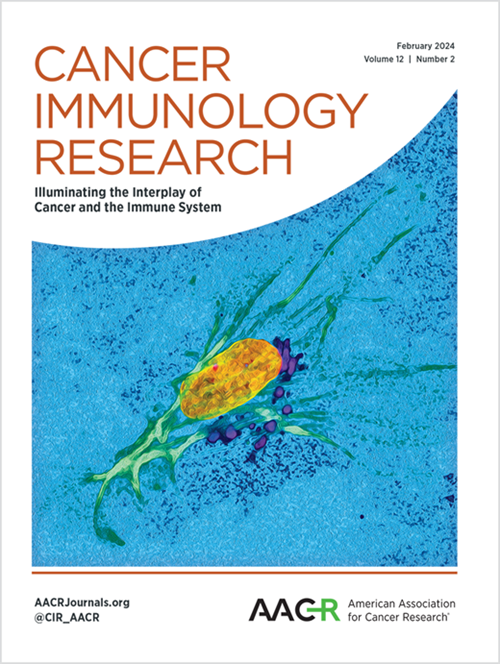T-cell expression of CXCL13 is associated with immunotherapy response in a sex-dependent manner in patients with lung cancer
IF 8.1
1区 医学
Q1 IMMUNOLOGY
引用次数: 0
Abstract
Emerging evidence in preclinical models demonstrates that antitumor immunity is not equivalent between males and females. However, more investigation in patients and across a wider range of cancer types is needed to fully understand sex as a variable in tumor immune responses. We investigated differences in T-cell responses between male and female patients with lung cancer by performing sex-based analysis of single cell transcriptomic datasets. We found that the transcript encoding CXC motif chemokine ligand 13 (CXCL13), which has recently been shown to correlate with T-cell tumor specificity, is expressed at greater levels in T cells isolated from female compared to male patients. Furthermore, increased expression of CXCL13 was associated with response to PD-1–targeting immunotherapy in female but not male patients. These findings suggest that there are sex-based differences in T-cell function required for response to anti–PD-1 therapy in lung cancer that may need to be considered during patient treatment decisions.肺癌患者 T 细胞中 CXCL13 的表达与免疫疗法反应的性别依赖性有关
临床前模型的新证据表明,男性和女性的抗肿瘤免疫力并不相同。然而,要充分了解性别作为肿瘤免疫反应中的一个变量,还需要对患者和更广泛的癌症类型进行更多的调查。我们通过对单细胞转录组数据集进行基于性别的分析,研究了肺癌男女患者之间 T 细胞反应的差异。我们发现,与男性患者相比,编码 CXC motif 趋化因子配体 13(CXCL13)的转录本在女性患者分离出的 T 细胞中的表达水平更高。此外,CXCL13表达的增加与女性患者而非男性患者对PD-1靶向免疫疗法的反应有关。这些研究结果表明,肺癌患者对抗PD-1疗法产生反应所需的T细胞功能存在性别差异,患者在做出治疗决定时可能需要考虑到这一点。
本文章由计算机程序翻译,如有差异,请以英文原文为准。
求助全文
约1分钟内获得全文
求助全文
来源期刊

Cancer immunology research
ONCOLOGY-IMMUNOLOGY
CiteScore
15.60
自引率
1.00%
发文量
260
期刊介绍:
Cancer Immunology Research publishes exceptional original articles showcasing significant breakthroughs across the spectrum of cancer immunology. From fundamental inquiries into host-tumor interactions to developmental therapeutics, early translational studies, and comprehensive analyses of late-stage clinical trials, the journal provides a comprehensive view of the discipline. In addition to original research, the journal features reviews and opinion pieces of broad significance, fostering cross-disciplinary collaboration within the cancer research community. Serving as a premier resource for immunology knowledge in cancer research, the journal drives deeper insights into the host-tumor relationship, potent cancer treatments, and enhanced clinical outcomes.
Key areas of interest include endogenous antitumor immunity, tumor-promoting inflammation, cancer antigens, vaccines, antibodies, cellular therapy, cytokines, immune regulation, immune suppression, immunomodulatory effects of cancer treatment, emerging technologies, and insightful clinical investigations with immunological implications.
 求助内容:
求助内容: 应助结果提醒方式:
应助结果提醒方式:


